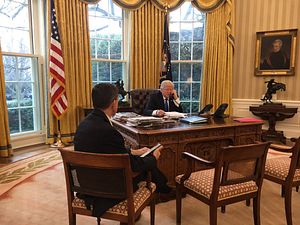When the democratically-elected president of the United States, Donald J. Trump, accepted a congratulatory telephone call from the democratically-elected president of Taiwan, Tsai Ing-wen, it generated shock waves throughout the Asian governmental and scholarly communities.
All agreed it was a dramatic departure from four decades of the United States’ official non-recognition and partial isolation of the island that both the China’s Communist leaders and the people of Taiwan consider their own.
But opinions varied wildly on two questions: (a) whether it was a one-off, minor slip-up by a new administration as yet unschooled in the diplomatic etiquette of U.S.-China relations, or a harbinger of fundamental U.S. policy re-assessment; and (b) whether it was a good thing or a bad thing.
The call was quickly followed by a presidential tweet responding to concerns that the U.S. One China policy was being upended: “I fully understand the ‘one China’ policy, but I don’t know why we have to be bound by a ‘one China’ policy unless we make a deal with China having to do with other things, including trade.”
That seemed to point in the direction of substantial policy shift and naturally stirred the waters even more (including by some worried Taiwan would be seen as “a bargaining chip” for other U.S. concerns). The sense of policy turbulence was reinforced by statements from secretaries-designate Mattis (Defense) and Tillerson (State) indicating a more robust U.S. response to aggressive Chinese actions in the South China Sea.
Various official and unofficial statements from Beijing warned the new administration that U.S.-China relations would be dangerously destabilized if these policy expressions remained uncorrected. Many American experts amplified those warnings.
Chinese President Xi Jinping reportedly refused to speak on the telephone until Trump reaffirmed the One China formulation. It was done and the call took place, but that raised a set of new questions and concerns.
For example, what is not known from either the White House or Chinese accounts is whether any other concessions were made by either side to facilitate the accommodation.
Did Xi agree to back off China’s aggressive island-building, militarization, and harassment in the South China Sea? Did he acknowledge China’s enabling of North Korea’s nuclear weapons and missile program and pledge to press Pyongyang to reverse them?
Also unknown is whether the two leaders differentiated between China’s One China principle and the United States’ One China policy. The former says Taiwan is part of one China; the latter acknowledges that China (and some Taiwanese) says that, but Washington neither agrees nor disagrees, as long as the issue is settled peacefully and with the consent of the Taiwanese people.
Beijing ignores the last two tenets of American policy as buttressed by the 1979 Taiwan Relations Act, making Taiwan’s security and way of life a matter of U.S. national interest. Instead, it simply arrogates the U.S. position as identical to its own so that when Americans say One China policy, Beijing chooses to hear only the echo of its One China principle.
Further, it has reinforced the seriousness of its non-peaceful option by deploying 1,600 ballistic missiles targeting Taiwan and enacting in 2005 its Anti Secession Law, formally declaring the right to attack Taiwan under various scenarios, including Taiwan’s simply continuing the status quo of de facto independence.
As a master of communications, President Trump is uniquely qualified to set China straight on what America means by its policy based on a peaceful resolution of the Taiwan issue. He can remove the ambiguity by also discarding another dangerous ambiguity over what the U.S. would do in case of a Chinese attack on Taiwan.
He could do no better than by repeating the words once uttered by another American president known for his straight talk, George W. Bush; that America will do “whatever it takes” to defend Taiwan—only this time, the statement will not be walked back.
Such strategic clarity will imbue the two presidential phone calls—with Xi and Tsai—with a much-needed strategic coherence.
Joseph A. Bosco is a member of the U.S.-China task force at the Center for the National Interest and a nonresident senior associate at the Center for Strategic and International Studies. He previously served as China country desk officer in the Office of the Secretary of Defense from 2005-2006.

































